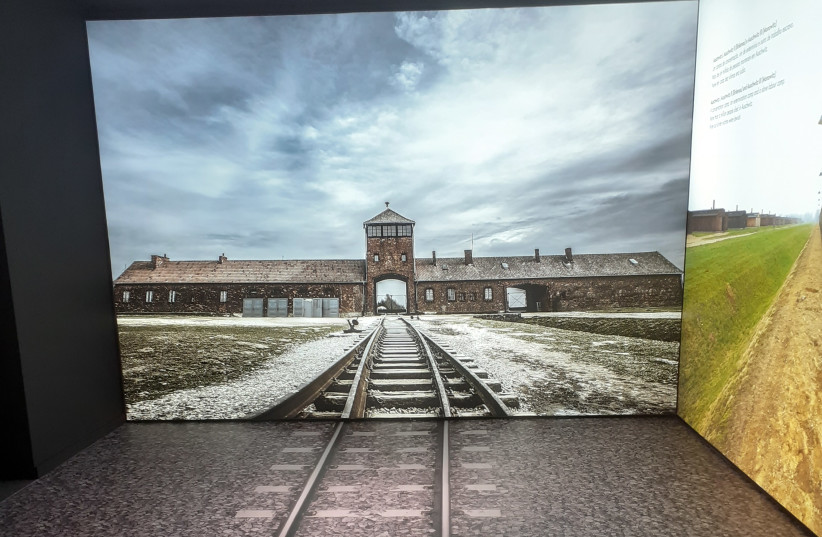One in five Americans believe the Holocaust of the Jewish people is a myth, according to polling data published by YouGov/The Economist on Thursday.
The poll, which surveyed 1,500 adult US citizens, asked respondents about their thoughts on a wide range of issues including the Jewish people, Israel, and the Holocaust.
Information on how respondents answered questions according to their gender, race, age, income level, and political affiliation, among other demographic groups, was recorded by the poll.
Of the categories that revealed the most striking differences between the demographics recorded, perhaps the most dramatic was regarding belief among the various age groups.

Asked how much discrimination Jewish people face in America today, nearly three-fourths of the respondents, (72%) responded “a great deal” or “a fair amount.”
Among respondents within the youngest age bracket (18-29) this fell to 61%.
Antisemitism somewhat less important than Islamophobia for young Americans
This same age bracket was on par with the general sentiment regarding discrimination against Muslims as 72% of those aged 18-29 said Muslims face “a great deal” or “a fair amount” of discrimination in the US today, similar to 73% of the total population who said the same.
Asked how serious of a problem hate crimes in the US against Jews is, almost two-thirds (65%) responded that it was a “very serious” or “somewhat serious” problem. In comparison, only 56% of youngest cohort answered likewise.
In response to the question of how serious a problem antisemitism is in the US, the younger generation was far closer to being in step with the general population of respondents than other cohorts. Some 63% of all respondents said it was a “very serious” or “somewhat serious” problem; among the youngest age bracket, 60% agreed.
Representing a significant increase, some 64% of 18-29 year-olds, compared to 56% of the aggregated total, said that discrimination against Muslims was a “very serious” or a “somewhat serious” problem.
Next, regarding whether opposition to Israel’s treatment of the Palestinians was antisemitic, most respondents stated that they believed it was either not antisemitic (40%) or were unsure (40%).
A further 30% said it was not antisemitic to boycott Israeli products in protest of Israeli government policy; some 33% said that is was, and the remaining 37% were unsure.
A full two thirds (67%) then said it was indeed antisemitic to deny that the Holocaust happened. Another 9% said that it wasn’t and the rest were unsure.
This figure drastically changes when the 18-29 year-old age bracket is singled out. Among this group, less than half (46%) said that to deny that the Holocaust happened is antisemitic while 17% said it was not; the rest were unsure.
There was, however, one area where the results were reversed. The youngest age bracket was slightly more likely than the aggregated total (38% compared to 34%) to believe it was antisemitic to believe American Jews are more loyal to Israel than they are to the US. T
Still, the youngest group of respondents was less likely than the sum total (31% compared to 37%) to say it was antisemitic to cut off academic ties between American universities and Israeli universities in protest of Israeli government policy.
Young Americans disbelieve in the Holocaust more than any other group polled
In a subsection entitled “Agreement with Statements about Israel,” while 7% of the total population of respondents said they believed the holocaust was a myth, almost three times as many of 18-29 year-old respondents (20%) said the same thing.
In fact, compared to more than three-fourths (77%) of the total population who actively said that they disagreed with the statement “they Holocaust is a myth,” only a little more than half (51%) of the youngest age bracket answered likewise.
Slightly larger proportions of the aggregate population and 18-29 year-old age group (9% and 23% respectively) said they believed the Holocaust was exaggerated.
Asked if they agreed with a slew of statements widely considered antisemitic including “Jews have too much power in America,” “People should boycott Israeli goods and products,” “Israel exploits Holocaust victimhood for its own purposes,” “Israel has too much control over global affairs,” and “the interests of Israelis are at odds with the interests of the rest of the world,” the youngest age bracket answered in the affirmative more so than any other group.
A significant proportion of this age group also believed that Israel is an apartheid state (32%) and that Israel is deliberately trying to wipe out the Palestinian population (40%). Again, these proportions were higher than among any other group accounted for in the polling.
Additionally, the proportion of the youngest age bracket who agreed that American Jews make a positive contribution to American society (52%) was also smaller than any other group.
This 18-29 year-old age group also had the largest proportion of respondents who disagreed with the statement that Israel has a right to exist.
